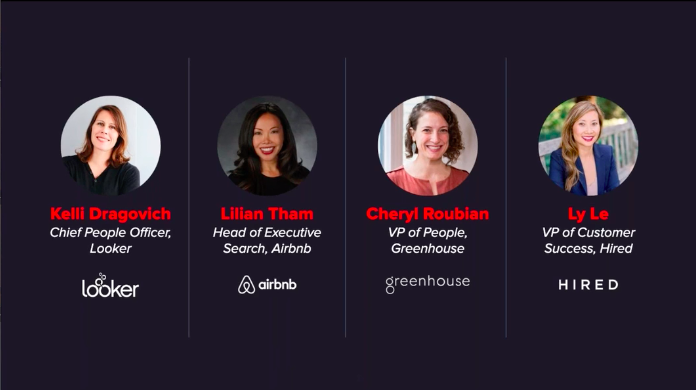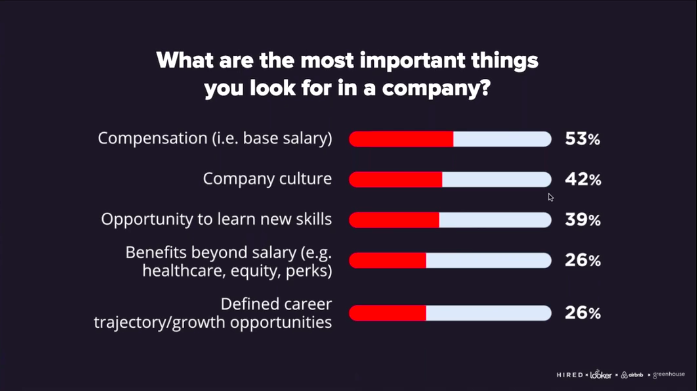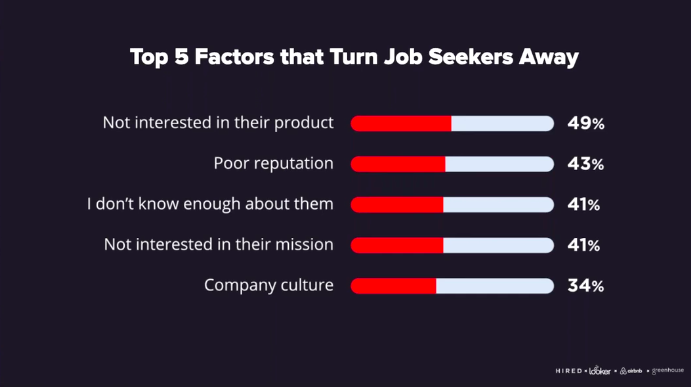Employer branding tips from Airbnb, Hired, Looker and Greenhouse

4 mins, 8 secs read time
Ah, fall. The new season brings cooler temperatures (at least to those of us in the Northern Hemisphere), pumpkin spiced everything… and the pressing sense that we’re drawing to the close of another year. Now that Q4 is well underway, many Talent professionals are already planning for 2020. Which Talent trends can we anticipate? And how might they affect your approach to employer brand?
These were the questions driving the recent “Emerging Trends in Employer Brand” webinar. Hired’s VP of Customer Success Ly Le led a panel discussion with Airbnb’s Head of Executive Search Lilian Tham, Greenhouse’s VP of People Cheryl Roubian and Looker’s Chief People Officer Kelli Dragovich. With a focus on employer brand, the panelists examined what attracts candidates, what repels them and which steps you can take to define and share your employer brand.

We’ll be covering a few highlights from the webinar here. Hoping to dig deeper into the discussion? Watch the on-demand webinar here.
What Matters Most to Job Seekers
Ly began by sharing some insights from Hired’s latest Global Brand Health Report. When asked which factors they consider most when evaluating a company, after compensation, the majority of respondents said “company culture.”

The key takeaway here: culture still counts. Cheryl shared the Greenhouse philosophy on this topic: When it comes to salary, anchor yourself to market data and focus on internal parity. If you’re committed to these types of hiring processes, it means that candidates won’t need to factor compensation into their decision of which role to accept.
“Pay people enough to take compensation off the table so they don’t have to think about it.”—Cheryl Roubian, VP of People at Greenhouse
How to Scare Candidates Away
The top factors that turn job seekers away, according to Hired’s Global Brand Health Report, include not being interested in a company’s product, a poor reputation, not knowing enough about the company and not being interested in their mission. The panelists agreed that many of these issues can be addressed by creating a clear and unique employer value proposition and getting serious about providing a stellar candidate experience.

Kelli sees an emerging trend of employers asking candidates about their long-term vision. In the past, employers focused on trying to uncover what a prospective candidate could do only within the context of their own company. Now employers are trying to learn about candidates’ motivations and goals in a larger sense to ensure that their values are aligned.
How can a company improve its reputation? Cheryl says this begins with committing resources and attention to candidate experience and employee engagement. She recommends using a survey to collect feedback – and then creating an action plan to take steps based on what you learn from it. “It’s a whole ecosystem of being really intentional and thoughtful about how you’re treating your employees,” says Cheryl.
Sharing Your Values with Candidates
Hoping to help candidates better understand your core values? Lilian recommends creating consistency in the candidate journey and empowering all employees to feel like they own this process. At Airbnb, this happens at all levels. Airbnb CEO Brian Chesky embodies the core values and mission, and regularly shares them outside the company. The People team helps shepherd those values throughout the employee experience. And there’s a dedicated Employment Brand Manager whose job is to help articulate Airbnb’s employee value proposition.
“Organizations are made of many people and they never stop changing and evolving,” says Kelli. That’s why it’s important to keep track of how you’re being perceived and how that compares to where you want to be. Kelli recommends tapping into your alumni community – asking them about their experiences and perceptions can help you measure the continued impact of your company values and brand.
Cheryl sees employer brand as three broad categories: What are you doing to let people in the world know who you are? How are you representing that to candidates? And how does that brand resonate with your existing staff? In order to get aligned on all three, Cheryl recommends talking to as many employees as you can. Find the common threads that draw people to your company and keep them there. Then you can work with your marketing and recruiting teams to make sure these messages are shared with prospects and candidates.
Whether you decide to focus on equitable compensation, creating clear company values or improving your candidate experience, you now have plenty of ideas to fuel your approach to employer branding in the coming year.
Want to hear our panelists’ take on Learning & Development, company culture and monitoring the success of your branding efforts? Tune in to the full webinar for even more actionable insights!
